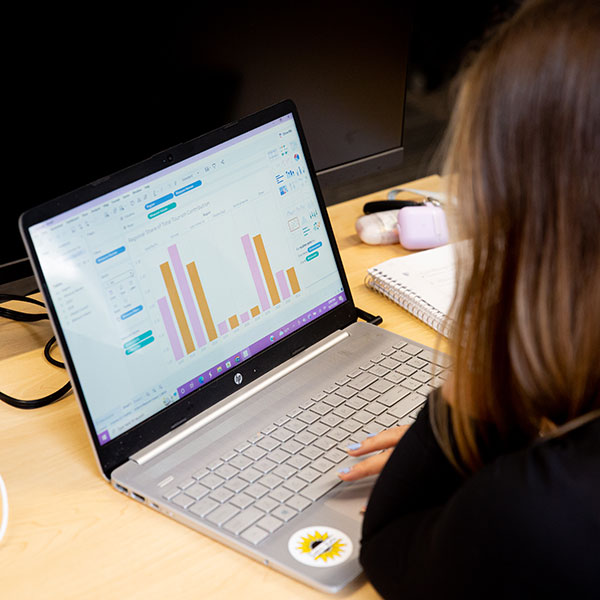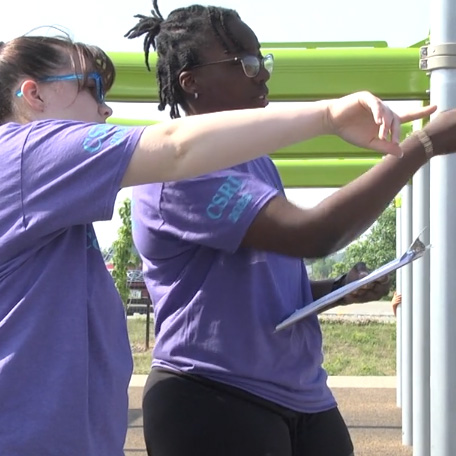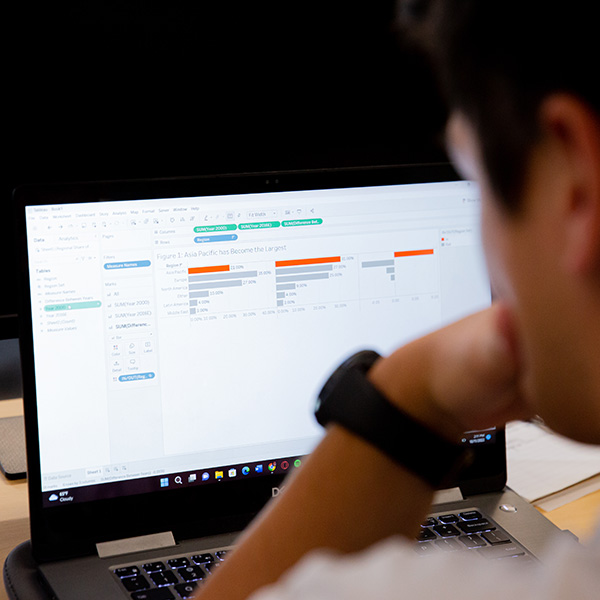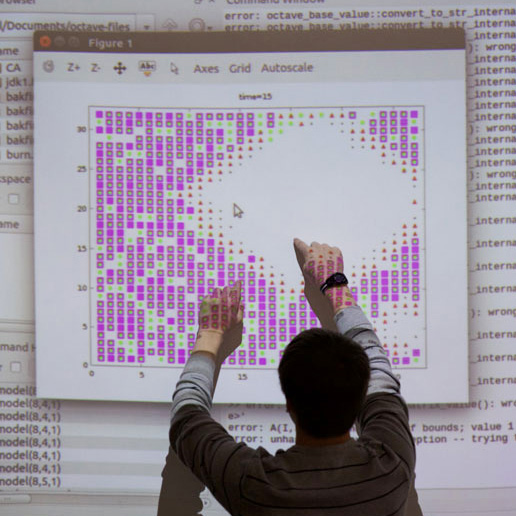Applied Statistics Major
Why study applied statistics at Cornell College?
As a statistician, your analysis of data allows you to discover patterns—patterns that can tell a story and help you solve a problem or illustrate complex issues in a way that people who aren't as data-driven will understand. We created this major to answer the need for data experts who use traditional statistical methods to analyze smaller data sets (1000 observations or less) in situations like clinical trials and surveys. This sets you up to analyze a problem, determine the data to be collected, then interpret the data into actionable plans to address the original problem.
During your course of study you'll be encouraged to explore coursework in applied statistics, data analysis, and computer science to see where statistical analysis fits in the spectrum of using data for problem solving. Data science tackles big data sets, computer science helps to write the programs that perform data segmentation and analysis. With an interdisciplinary approach to your studies, you'll offer a full skillset to your future employer.
Opportunities in statistical analysis span many industries. Recent grads have gone on to roles as actuaries in several companies; a biostatistician at Duke University; a Data Journalist; and an Analyst at Fidelity Insurance.
When you're studying One Course At A Time, you'll have the opportunity focus on a single topic each block and collaborate with your classmates and your professor to make the most of your time in class.
Cornell Summer Research Institute: working with data sets
Data sets come with lots of questions. What do the numbers mean and how can the average person understand them? That’s exactly what three Cornell Summer Research Institute (CSRI) students set out to discover as they dove into three datasets on topics ranging from crime to rivers and archeological pottery.
Recent CSRI projects in applied statistics have focused on COVID-19, water quality, the origins of pottery, predicting NO3 levels, creating interactive homework, investigating convictions, and the analysis of parasitic wasps. The options are only limited by the question you want to ask and availability of data. What topic would you like to research?
Applied statistics course and degree requirements

Data is all around us, and drives many decisions made every day. In your statistics courses you will learn the process of making good decisions from data. This includes the intricacies of collecting appropriate data, to the many methods that may be appropriate for analyzing data, to communicating the results to the original researcher in language that they will understand. In your course work you'll be encouraged to explore in-depth topics with work in fields of inquiry.
Applied Statistics capstone
Over your senior year, you will work with your capstone advisor to apply all that you have learned. You will start by picking an area of interest and gathering relevant data. Then you will use the knowledge you have gained through your years at Cornell to analyze the data. Block 6 is reserved for you to write your capstone paper and prepare for your presentation at the Cornell Student Symposium. Some topics previous students have studied include the NBA, epidemics, oil prices, natural language processing, crime, and traffic safety.

Using applied statistics in research
You can work with a faculty mentor to develop a research project for applied statistics, specifically, or you may likely find the opportunity to employ your skills with statistical methods as part of a team on a wide variety of topic areas for on-campus and off-campus research opportunities. You can help set the data collection methods and formats, then interpret the collected data to address the questions your research project set out to answer.
You’ll also have the opportunity to take your research results on the road and present your findings at the Iowa Chapter of American Statistical Association conference, where you can see what other students are researching, talk with industry experts, and make new connections (and maybe win a cash prize for your presentation).

Team competition takes analytics on the road
You might find yourself as part of a team of statisticians and data scientists as you compete at the Midwest Undergraduate Data Analytics Competition (MUDAC). Your team will come together to solve a dataset problem like predicting season ticket renewals for a hockey team to with models based on actual historical data to identify an implementable solution to maximize future sales. You'll gain experience that gives you a foundation to approach a future problem (like dazzling your new employer).
Internships in applied statistics
Working with employers and gaining real-world experience analyzing different types of data can help you envision where you want to take your research or work in the future. Gaining experience with methods used in businesses also increases your marketability with employers when you graduate. Cornellians have worked on internship projects at the NE Fisheries in Woods Hole, MA; for Cornell’s own baseball team, and for the Cornell Office of Alumni and College Advancement.
What are Cornell students doing in internships? Check out their blogs

Career opportunities for students of applied statistics
The mean annual wage in 2022 (latest available data) for statisticians was listed at $105,510 per The U.S. Bureau of Labor Statistics.
Potential industries for statisticians are wide reaching. Whenever an organization has cause to collect data, whether that is in a clinical trial or client survey, there is the need to interpret the results into actionable next steps. You will find opportunities in medical fields (epidemiology and biostatistics), in business fields focused on economics, measuring polls for political campaigns and examining data for psychologists, sociologists, biologists, kinesiologists.
Careers in Business & Finance Careers in Computer Science & IT
Studying STEM at Cornell College
As an incoming student interested in STEM fields, you'll be part of a vibrant community who are interested in discovering and impacting how the world around us works.

